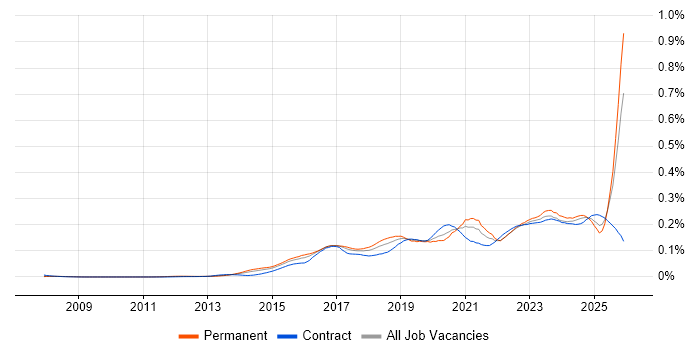Cybersecurity Analyst
UK
The median Cybersecurity Analyst salary in the UK is £57,500 per year, according to job vacancies posted during the 6 months leading to 11 May 2025.
The table below provides salary benchmarking and summary statistics, comparing them to the same period in the previous two years.
| 6 months to 11 May 2025 |
Same period 2024 | Same period 2023 | |
|---|---|---|---|
| Rank | 624 | 702 | 811 |
| Rank change year-on-year | +78 | +109 | +201 |
| Permanent jobs requiring a Cybersecurity Analyst | 82 | 199 | 170 |
| As % of all permanent jobs advertised in the UK | 0.15% | 0.20% | 0.17% |
| As % of the Job Titles category | 0.17% | 0.21% | 0.18% |
| Number of salaries quoted | 68 | 175 | 138 |
| 10th Percentile | £46,250 | £37,500 | £37,203 |
| 25th Percentile | £52,250 | £45,000 | £41,250 |
| Median annual salary (50th Percentile) | £57,500 | £55,000 | £52,067 |
| Median % change year-on-year | +4.55% | +5.63% | +9.61% |
| 75th Percentile | £75,000 | £70,000 | £63,438 |
| 90th Percentile | £92,500 | £77,500 | £79,300 |
| UK excluding London median annual salary | £54,375 | £50,000 | £42,500 |
| % change year-on-year | +8.75% | +17.65% | -5.56% |
All Permanent IT Job Vacancies
UK
For comparison with the information above, the following table provides summary statistics for all permanent IT job vacancies. Most job vacancies include a discernible job title that can be normalized. As such, the figures in the second row provide an indication of the number of permanent jobs in our overall sample.
| Permanent vacancies in the UK with a recognized job title | 49,511 | 93,886 | 92,389 |
| % of permanent jobs with a recognized job title | 90.48% | 94.63% | 91.46% |
| Number of salaries quoted | 27,626 | 67,255 | 58,266 |
| 10th Percentile | £30,000 | £28,500 | £32,500 |
| 25th Percentile | £41,250 | £38,500 | £45,000 |
| Median annual salary (50th Percentile) | £57,443 | £52,500 | £60,000 |
| Median % change year-on-year | +9.41% | -12.50% | - |
| 75th Percentile | £75,000 | £71,250 | £81,000 |
| 90th Percentile | £97,500 | £90,000 | £100,000 |
| UK excluding London median annual salary | £52,000 | £50,000 | £53,000 |
| % change year-on-year | +4.00% | -5.66% | +6.00% |
Cybersecurity Analyst
Job Vacancy Trend
Job postings that featured Cybersecurity Analyst in the job title as a proportion of all IT jobs advertised.

Cybersecurity Analyst
Salary Trend
3-month moving average salary quoted in jobs citing Cybersecurity Analyst.
Cybersecurity Analyst
Salary Histogram
Salary distribution for jobs citing Cybersecurity Analyst over the 6 months to 11 May 2025.
Cybersecurity Analyst
Top 12 Job Locations
The table below looks at the demand and provides a guide to the median salaries quoted in IT jobs citing Cybersecurity Analyst within the UK over the 6 months to 11 May 2025. The 'Rank Change' column provides an indication of the change in demand within each location based on the same 6 month period last year.
| Location | Rank Change on Same Period Last Year |
Matching Permanent IT Job Ads |
Median Salary Past 6 Months |
Median Salary % Change on Same Period Last Year |
Live Jobs |
|---|---|---|---|---|---|
| England | +53 | 75 | £60,000 | +9.09% | 47 |
| UK excluding London | +92 | 36 | £54,375 | +8.75% | 32 |
| London | +77 | 32 | £75,000 | +27.66% | 25 |
| Work from Home | +115 | 24 | £55,000 | - | 34 |
| South East | +83 | 10 | £51,750 | -23.33% | 17 |
| Scotland | +115 | 6 | £55,000 | +10.00% | 3 |
| East of England | +35 | 6 | £47,500 | -5.00% | 5 |
| South West | +76 | 5 | £55,000 | -15.38% | 1 |
| North of England | +35 | 5 | £46,000 | +8.24% | 5 |
| North West | -5 | 5 | £46,000 | +22.67% | 1 |
| Midlands | +62 | 4 | £50,000 | +6.38% | 3 |
| West Midlands | +60 | 4 | £50,000 | +36.05% | 2 |
Cybersecurity Analyst Skill Set
Top 30 Co-occurring Skills and Capabilities
For the 6 months to 11 May 2025, Cybersecurity Analyst job roles required the following skills and capabilities in order of popularity. The figures indicate the absolute number co-occurrences and as a proportion of all permanent job ads featuring Cybersecurity Analyst in the job title.
|
|
Cybersecurity Analyst Skill Set
Co-occurring Skills and Capabilities by Category
The follow tables expand on the table above by listing co-occurrences grouped by category. The same employment type, locality and period is covered with up to 20 co-occurrences shown in each of the following categories:
|
|
|||||||||||||||||||||||||||||||||||||||||||||||||||||||||||||||||||||||||||||||||
|
|
|||||||||||||||||||||||||||||||||||||||||||||||||||||||||||||||||||||||||||||||||
|
|
|||||||||||||||||||||||||||||||||||||||||||||||||||||||||||||||||||||||||||||||||
|
|
|||||||||||||||||||||||||||||||||||||||||||||||||||||||||||||||||||||||||||||||||
|
|
|||||||||||||||||||||||||||||||||||||||||||||||||||||||||||||||||||||||||||||||||
|
|
|||||||||||||||||||||||||||||||||||||||||||||||||||||||||||||||||||||||||||||||||
|
|
|||||||||||||||||||||||||||||||||||||||||||||||||||||||||||||||||||||||||||||||||
|
|
|||||||||||||||||||||||||||||||||||||||||||||||||||||||||||||||||||||||||||||||||
